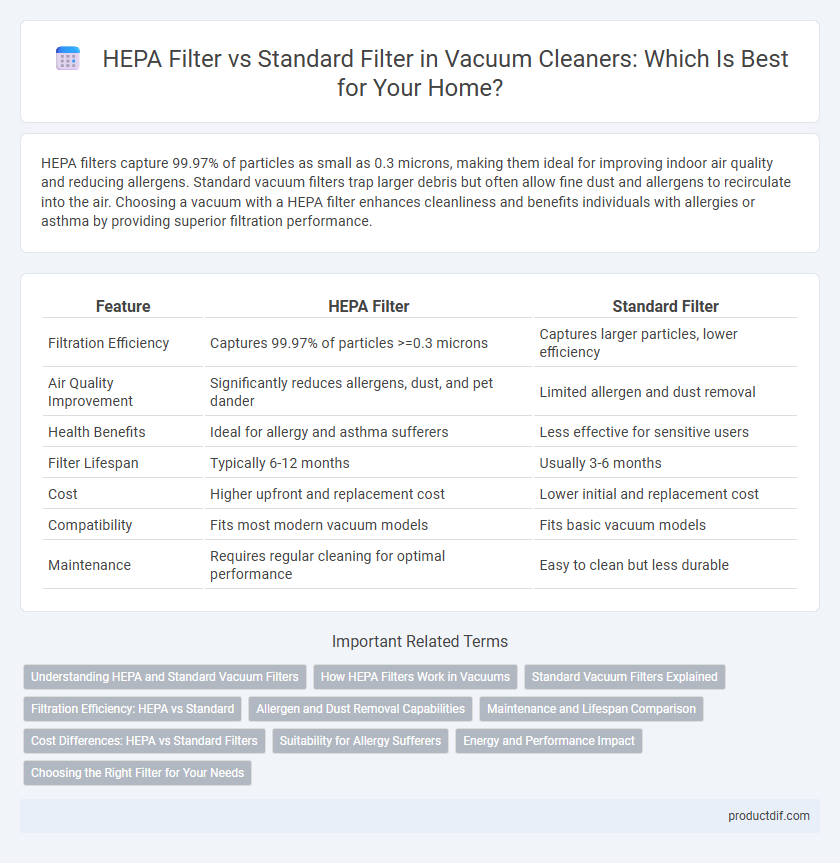HEPA filters capture 99.97% of particles as small as 0.3 microns, making them ideal for improving indoor air quality and reducing allergens. Standard vacuum filters trap larger debris but often allow fine dust and allergens to recirculate into the air. Choosing a vacuum with a HEPA filter enhances cleanliness and benefits individuals with allergies or asthma by providing superior filtration performance.
Table of Comparison
| Feature | HEPA Filter | Standard Filter |
|---|---|---|
| Filtration Efficiency | Captures 99.97% of particles >=0.3 microns | Captures larger particles, lower efficiency |
| Air Quality Improvement | Significantly reduces allergens, dust, and pet dander | Limited allergen and dust removal |
| Health Benefits | Ideal for allergy and asthma sufferers | Less effective for sensitive users |
| Filter Lifespan | Typically 6-12 months | Usually 3-6 months |
| Cost | Higher upfront and replacement cost | Lower initial and replacement cost |
| Compatibility | Fits most modern vacuum models | Fits basic vacuum models |
| Maintenance | Requires regular cleaning for optimal performance | Easy to clean but less durable |
Understanding HEPA and Standard Vacuum Filters
HEPA filters capture 99.97% of particles as small as 0.3 microns, making them highly effective for allergen and fine dust removal compared to standard vacuum filters that typically trap larger particles but allow finer dust and allergens to pass through. Standard filters rely on basic filtration layers, which can reduce vacuum efficiency by clogging faster and require frequent replacement to maintain performance. Understanding the superior filtration capability of HEPA filters is crucial for improving indoor air quality and achieving deeper cleaning results in households with pets, allergy sufferers, or asthma patients.
How HEPA Filters Work in Vacuums
HEPA filters in vacuums trap 99.97% of particles as small as 0.3 microns by forcing air through a dense mat of fibers, capturing allergens, dust mites, and pet dander effectively. Standard filters primarily capture larger debris and allow finer particles to recirculate back into the air, reducing indoor air quality. HEPA filtration enhances vacuum performance by improving airborne contaminant removal, making it ideal for allergy sufferers and maintaining cleaner home environments.
Standard Vacuum Filters Explained
Standard vacuum filters capture larger dust particles and debris but are less effective at trapping microscopic allergens and fine dust compared to HEPA filters. These filters typically consist of foam, cloth, or paper materials designed for basic filtration and often require frequent replacement to maintain suction efficiency. Standard filters are suitable for general cleaning tasks but may not provide the air quality improvement necessary for allergy sufferers or those with respiratory sensitivities.
Filtration Efficiency: HEPA vs Standard
HEPA filters capture 99.97% of particles as small as 0.3 microns, significantly outperforming standard vacuum filters that typically trap larger particles with less than 50% efficiency. The advanced filtration technology in HEPA filters effectively removes allergens, dust mites, pet dander, and fine dust, improving indoor air quality. Standard filters allow more microscopic particles to recirculate into the air, making HEPA filters essential for allergy sufferers and environments requiring superior cleanliness.
Allergen and Dust Removal Capabilities
HEPA filters capture 99.97% of particles as small as 0.3 microns, effectively trapping allergens like pollen, pet dander, and dust mites, making them ideal for improving indoor air quality. Standard vacuum filters typically remove larger dust particles but allow finer allergens to escape, reducing overall filtration efficiency. For households with allergy sufferers, selecting a vacuum equipped with a HEPA filter significantly enhances dust and allergen removal.
Maintenance and Lifespan Comparison
HEPA filters in vacuums require regular maintenance, such as gentle washing or replacement every 6-12 months, to maintain optimal air filtration and prevent clogging, whereas standard filters often need more frequent replacements due to lower filtration efficiency. The lifespan of HEPA filters generally exceeds that of standard filters, lasting up to one year with proper care, compared to standard filters that may require replacement every 3-6 months. Investing in a HEPA filter can result in longer-lasting performance and reduced maintenance frequency, improving overall vacuum efficiency and air quality.
Cost Differences: HEPA vs Standard Filters
HEPA filters generally cost between $20 and $50, significantly higher than standard vacuum filters, which range from $5 to $15. The premium price of HEPA filters reflects their advanced filtration technology that captures 99.97% of particles as small as 0.3 microns, enhancing air quality and allergy protection. Despite the initial investment, HEPA filters may reduce long-term health-related expenses, making them cost-effective for sensitive environments compared to standard filters.
Suitability for Allergy Sufferers
HEPA filters in vacuums are highly effective for allergy sufferers as they trap 99.97% of particles as small as 0.3 microns, including pollen, dust mites, and pet dander. Standard filters typically allow finer allergens to recirculate into the air, reducing indoor air quality. Choosing a vacuum with a certified HEPA filter ensures significantly cleaner air and relief from allergy symptoms.
Energy and Performance Impact
HEPA filters capture 99.97% of particles as small as 0.3 microns, improving indoor air quality but often causing higher energy consumption due to increased airflow resistance. Standard filters allow greater airflow with lower energy use but trap fewer fine particles, reducing overall vacuum performance in allergen removal. Choosing HEPA filters enhances cleaning efficiency and air filtration at the cost of potentially higher electricity usage and shorter vacuum motor lifespan.
Choosing the Right Filter for Your Needs
HEPA filters capture 99.97% of particles as small as 0.3 microns, making them ideal for allergy sufferers and those seeking improved indoor air quality. Standard filters typically trap larger debris but may allow fine dust and allergens to recirculate, suitable for general cleaning on non-sensitive surfaces. Selecting the right vacuum filter depends on your specific needs for air purity, allergy control, and maintenance frequency.
HEPA filter vs Standard filter (vacuum) Infographic

 productdif.com
productdif.com